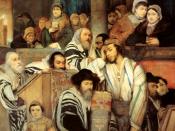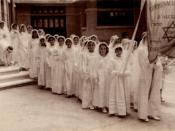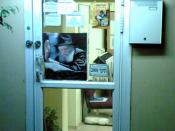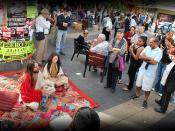Judaism � PAGE \* MERGEFORMAT �2�
Judaism
Jeff Weigel
Axia College of University of Phoenix
March 13, 2008
Today Judaism is one of the oldest religions still existing. It began as the religion of the small nation of the Hebrews, and through thousands of years of suffering, persecution, dispersion, and occasional victory, has continued to be a profoundly influential religion and culture.
Nearly 3.5 billion follow belief systems directly influenced by Judaism (including Christianity, Islam, and the Bah'ai Faith), 14 million people identify themselves as Jews. Modern Judaism is a complex phenomenon that incorporates both a nation and a religion, and often combines strict adherence to ritual laws with a more liberal attitude towards religious belief.
Only one God is the central religious belief of Judaism. According to Jewish tradition God himself revealed Monotheism to Abraham, the ancestor of the Jewish people. Monotheism was uncommon at the time Judaism was born.
God has always taken special care of the Hebrews (who would later become the Jews). God revealed the Ten Commandments to Moses and many more religious and ethical guidelines in the Torah ("the Law") after rescuing them from slavery in Egypt. Many of the guidelines (mitzvah) emphasized ritual purity and the importance of remaining set apart from the surrounding polytheistic cultures.
Jewish identity arises primarily from belonging to an ancient people and upholding its traditions. Dogma, while important, is secondary. Although the medieval thinker Rabbi Maimonides once enumerated "13 Articles of Faith" many Jews do not accept all these, and Jewish beliefs vary widely on theological matters such as human nature and the afterlife.
Judaism has divisions, known as "movements" which have developed in modern times as varying responses to secularism and modernity. Orthodox Judaism is the most conservative group, retaining nearly all traditional rituals and practices. At the opposite end of the spectrum, Reform Jews retain their Jewish identity and some traditions but take a liberal approach to many Jewish beliefs and practices. Conservative Judaism lies in the middle of the spectrum, taking a moderate approach in its application of Judaism to the modern world.
Jews of all movement celebrate many special days throughout the year and throughout each person's life. Passover, Rosh Hashana and Yom Kippur, are the major religious holidays celebrated. Hanukkah, historically a minor holiday, has become more prominent in the last century for Jews who live in areas that celebrate Christmas. The Sabbath, a day of rest and worship at the synagogue, is observed each Saturday. In Judaism, all days begin at sunset, so all holidays begin at sundown and end at sundown.
To recognize the role of God and the Jewish community in each person's life, numerous life cycle events are observed with traditional rituals. At the first Sabbath after the birth of a child, the proud father is called forward in the synagogue to recite blessings for mother and child. Circumcision takes place eight days after birth a baby boys birth.
At the age of 13 (12 for girls), a boy becomes a Bar Mitzvah, or "Son of the Commandment" and a girl becomes a Bat Mitzvah, "Daughter of the Commandment." The occasion is marked by the youth's first public reading of the Torah in the synagogue (only boys may do this in Orthodox congregations), followed by a large and joyous celebration.
Jewish wedding ceremonies incorporate many ancient traditions and symbolic gestures (including the well-known breaking of glass), and divorces are obtained within the Jewish community. At death, a Jewish person's body is cared for by the chevra kiddisha, the "holy society," who wash the body and prepare it for burial. The deceased is treated with great respect and never left alone. After burial, the deceased's loved ones enter a formal period of mourning, which decreased gradually over the course of a year. The dead is then remembered and honored each year on the anniversary of death.
In addition to these special days and ceremonies, the Jewish life is marked by regular religious observance. Each Saturday, Sabbath is observed by ceasing work and spending the day in worship at the synagogue and at home with family. The study of Torah and other Jewish scriptures is considered very important, and many Jewish children attend Hebrew school so they can study it in its original language. In everyday life, traditional Jews observe the laws of kashrut, eating only foods that God has designated 'kosher". Among non-kosher, or prohibited, foods are pork, any meat that has not been ritually slaughtered, shellfish, and any meal that combines dairy with meat (Unkown 2008).
Chaim Goldberger is the Rabbi at Kenesseth Israel Congregation. It is a Modern Orthodox Jewish congregation with 120 members located in St. Louis Park at 4330 W. 28th Street.
This interview was rather short as he was called away due to a family affair, but I had the feeling he was not happy about to begin with, it was set up by his secretary. He knew nothing about it; I was able to ask two questions before he had to leave. The first question I asked was; At what age did you realize this was a religion you wanted to continue to follow? His answer was that he has always loved this religion and has never thought about not following it, he then asked for the next question. I stated that I hoped my last question did not offend him in any way, as it was not meant to. I then asked him; At what age did you want to persue a career in this religion? He replied, this is the religion that I have always loved and I would have not chosen another career. He then said that he received a text from a family member and must leave immediately. I said I hope everything would be alright and left, I was a little disappointed, I did not mean to offend him, and I was very careful not to.
The biggest difference between Judaism and Christianity is The Messiah and Jesus. Two thousand years ago, a large faction occurred among the Jewish people: there were those who saw Jesus as divine and those who saw him as human. The first devotees of Jesus Christ were in fact devout Jews. Some of those believers in Jesus remained faithful to Judaism and considered themselves part of the Jewish community, though they viewed Jesus as the Messiah. Another group of followers broke off completely from the Jewish community; this group eventually became known as Christians.
The fundamental difference between Judaism and Christianity is that Christians believe the Messiah, Christ, came two thousand years ago, while Jews are still awaiting their Messiah. So the question is then this: Why didn't the ancestors of today's Jews believe that Jesus was the Messiah?
The Messiah is supposed to usher in a time of justice; he will judge all nations. And yet, injustice and corruption were still rampant after Jesus was crucified. He failed to bring about the major prophecy of justice that the true Messiah would have completed.
Jesus also failed to fulfill the prophecy of world peace. Jews expected a time when they could get along with their enemies, the wolves, and war would no longer exist. On the contrary, Christians used war more and more to gain power and control. Jews couldn't imagine that the messianic age was upon them when believers in Jesus were causing so much bloodshed.
The current Jew still does not believe that Jesus was the Messiah. As starters, they believe that He was one of many first and second century Jews who claimed to be the Messiah, but in truth were imposters. Jews certainly don't think that Jesus meant to start a religion based on His ideas, let alone one to start a religion that would snowball into one of the most popular religions in the world. Jews actually believe that Christ didn't found Christianity (Unknown, 2008).
References
Unknown (2008), Overview of Judaism, retrieved March 4, 2008 from
http://www.religionfacts.com/judaism/fastfacts/overview.htm
Unknown (2008), Why Wasn't Jesus the Jewish Messiah, retrieved March 8, 2008 from
http://www.conncoll.edu/academics/departments/relstudies/290/judaism/jesus.html





